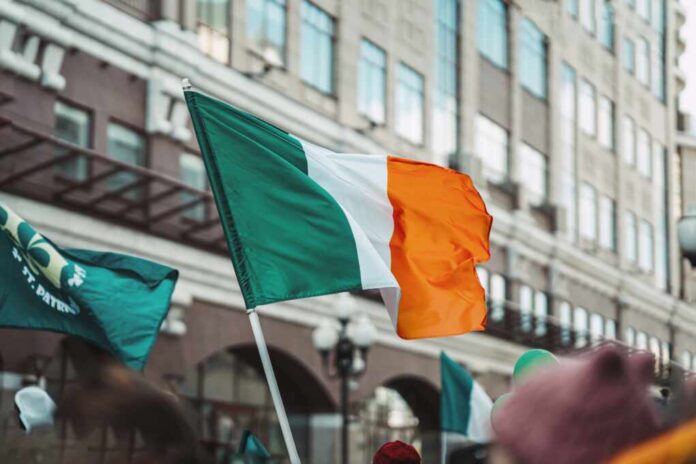
In a move sparking widespread concern among advocates of free speech, officials in Ireland are labeling expressions like “Irish Lives Matter” as hate speech. This development follows recent disturbances in Dublin and Northern Ireland, where protests against immigration policies have intensified. These incidents have captured the Irish public’s attention and resonated with American conservatives, highlighting similarities in immigration debates across the Atlantic.
The Dublin protests erupted after a stabbing incident involving an Algerian national outside a Gaelic-speaking school, leading to injuries of five people, including three children. In Belfast, Northern Ireland, anti-immigration sentiments were expressed through signs and graffiti stating “Irish Lives Matter.” This phrase, echoing the global Black Lives Matter movement, has been controversially classified as a hate incident by the Police Service of Northern Ireland.
If saying “Irish lives matter” in Ireland is a hate crime that’s the definition of a conquered nation pic.twitter.com/ebkWsP0RnV
— Auron MacIntyre (@AuronMacintyre) November 29, 2023
Critics, including conservative commentators Auron Macintyre and Lara Trump, have voiced their concerns on X, formerly known as Twitter. Macintyre’s comment, “If saying ‘Irish lives matter’ in Ireland is a hate crime, that’s the definition of a conquered nation,” encapsulates the frustration felt by many. Lara Trump further connected these events to broader issues of national sovereignty and immigration policies.
National Review staff writer Nate Hochman described the bill as “arguably the most radical legislation of its kind we’ve seen in the West.” The bill’s punitive measures against xenophobia, which include criminalizing the dissemination of certain materials, have been particularly contentious.
‘Irish Lives Matter’ Labeled As Hate Speech By Officials In Ireland Amid Dublin Protests https://t.co/TZy9WmzrIW #OAN
— One America News (@OANN) December 1, 2023
In response to the Dublin riots, leftist Irish Prime Minister Leo Varadkar has pledged to “modernize laws against hatred.” The bill, however, is drawing significant backlash for its potential impact on freedom of speech. Critics argue that the legislation, which targets material “likely to incite violence or hatred against persons on account of their protected characteristics,” is alarmingly vague and could criminalize possession of certain memes or politically sensitive material.
🇮🇪 Ireland used to be a safe haven in the EU due to not being part of NATO & it’s history of neutrality. Those days are over! The woke Irish Gov is working to criminalise memes & anti immigration voices.https://t.co/ScQVTs4OCz
— Europe Exit Plan (@EuropeExitPlan) November 28, 2023
Ireland’s current situation reflects a broader trend in European politics, where debates over immigration and national identity are increasingly polarized. The Irish government’s response, aiming to curb what it deems hate speech, raises fundamental questions about the balance between maintaining public order and preserving the right to free expression.
In a nation that has prided itself on its democratic values and commitment to free speech, the proposed legislation represents a significant shift. The debate in Ireland is not just about the specific incidents of violence or the phrases used in protests; it’s a larger conversation about how societies balance the need for security and harmony with the fundamental rights of free expression and dissent.
































